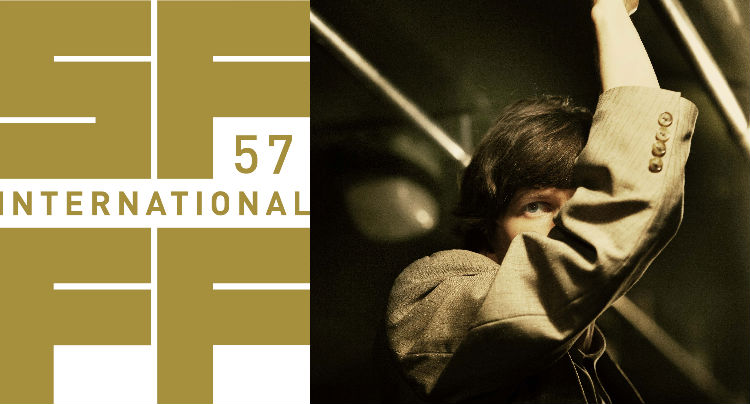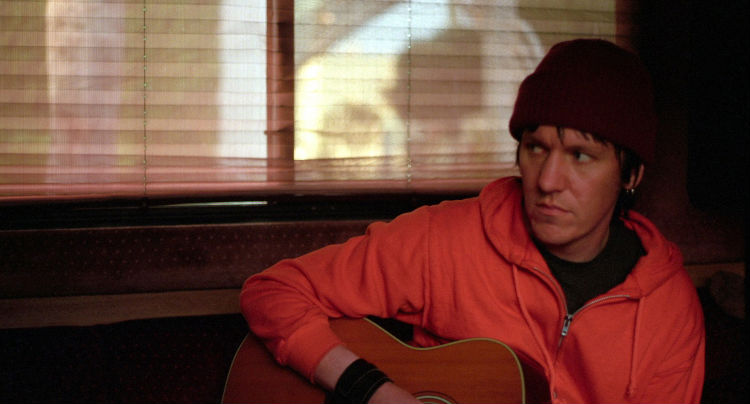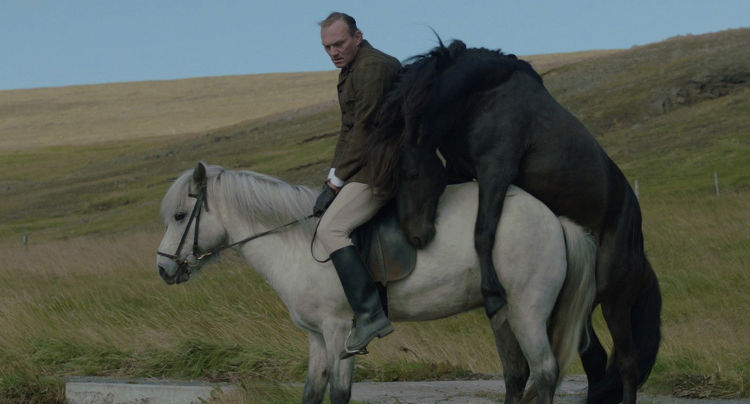SFIFF57: The Double, Heaven Adores You, Of Horses & Men, Impossible Light

In Submarine director Richard Ayoade’s stylish Dostoyevsky adaptation The Double, Jesse Eisenberg impresses yet again in a dual performance as Simon, a pushover office drone, and his cocky, better-in-every-way doppelganger James. Though Simon has worked at the office for seven years, no one seems capable of remembering him, due to his socially awkward, subservient nature. New hire James–who looks and dresses exactly like Simon–begins to take over the office and bend their co-workers to his whim (including Simon’s crush played by the radiant Mia Wasikowska), Simon finds himself so trampled and transparent he might as well be nonexistent.
The film resembles a steampunk version of Terry Gilliam’s Brazil, while also paying homage to myriad other weirdo auteurs like David Lynch and Orson Welles. Eisenberg is the perfect choice for the role(s), exuding the pitiful weakness of Simon and the brash dominance of James with equal adeptness. Ayoade’s taken a surprising turn following up Submarine, an entertaining teen comedy, with a dark, brutal, depressing film like The Double, but he proves he’s more than capable of handling such artfully ambitious material. The fact that the film is clearly derivative but feels uniquely Ayoade’s on the same token is astonishing.

One of the best singer-songwriters of a generation is given the tribute treatment in Nickolas Rossi’s Heaven Adores You, an intimate, revealing music doc about the life and art of indie legend Elliot Smith which made its world premiere at SFIFF57. Rossi, also an experienced DP, marries Smith’s hauntingly earnest music and lyrics with incredibly cinematic footage of Portland, the city synonymous with Smith’s legacy. Using a collection of photos, videos, and accounts from the people closest to the soft-spoken Smith, the film follows his story from childhood, through his prolific music career in which he moved millions, to his untimely death in 2003 to unexplained stab wounds.
Instead of following the tabloid route and sensationalizing the mystery of Smith’s death, Rossi lets the music dictate the form of the film. There’s a prevalent sense of Smith’s presence throughout the film, something most music docs are sorely missing. Audio of Smith’s guest appearances on radio shows has the chilling effect of making it feel as if he’s sitting right next to you, talking into your ear. Fans will be delighted at the tastefulness of the production, while the uninitiated will find a well-crafted introduction into the life and work of one of the greats.
The movie poster for Of Horses & Men is a hilarious head-scratcher: A depressed-looking man (Ingvar E. Sigurdsson) is mounted on a white-haired horse, head down in despair, as a black stallion takes his steed from behind. It doesn’t become clear just how emblematic the poster is until you’ve immersed yourself in Benedikt Erlingsson’s off-kilter, picturesque exploration of the bestial equity between man and horse. Later on, he mirrors the shocking horse-sex scene with one involving humans; surprisingly, the latter is no less cringe-worthy, and that’s sort of the point.

Erlingsson seamlessly weaves together a collection of short film-sized stories that take place in a small, horse-dependent village in Iceland. The quirky vignettes are comedic, grotesque, and strangely beautiful. In one, an alcoholic rides his horse into the ocean to catch a passing Russian boat and secure a jug of unearthly strong vodka. Another follows a Spanish tourist (Juan Camillo Roman Estrada) as he gets lost in the snow overnight with his horse and wrestles with the idea of resorting to the classic “Tauntaun” method of survival. What bumps the film up from minor to major achievement is its expert cinematography, which captures the majesty of horses unlike any movie I’ve seen, while capturing the stunning Icelandic landscape just as well. The film feels like a Nat-Geo special gone horribly wrong, in the best, left-field way possible.
In Jeremy Ambers’ Impossible Light, the first-time filmmaker follows the conceptualization, design, and construction of the gigantic piece of public art known as The Bay Lights. The project, dreamed up by Illuminate the Arts founder Ben Davis and designed by light artist Leo Villareal, had a crew of intrepid workers brave great heights, stringing thousands of LED’s up and down the suspension cables of San Francisco’s utilitarian western span of the Bay Bridge, sometimes under punishing weather conditions. That wouldn’t be the team’s biggest hurdle, however, as navigating a serpentine process of acquiring permits and raising funds almost squashed the project before they could hit the “on” switch.

Ambers takes the time to highlight the smallest details of the giant production, from the design of the clamps that hold the lights in place to the strategic placement of the lights themselves (so as not to distract on-bridge drivers). This attention to detail is fascinating and impressive, considering the 70 minute runtime. Ambers was essentially a one-man film crew, climbing to the bridge’s highest point with a camera strapped on, and the resulting footage is spectacular (and harrowing). In reality, there was no human antagonist vehemently opposing the project, but Ambers does his best to create a sense of urgency without the benefit of a human conflict angle. An uplifting film for a universally inspirational work of public art.
